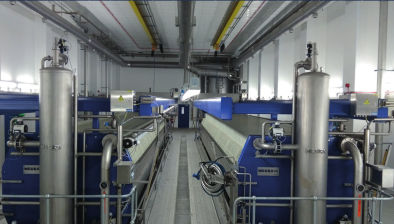Meura sells 500th Meura2001 mash filter in 2023
Belgium | In 2023 Meura sold the 500th Meura2001 mash filter. The product had first been introduced to the brewing world in 1989, nowadays it is used in the production of more than 25 % of the global beer volume.
Meura was founded in 1845 in Belgium by Jean-Baptiste Meura. From the very outset, the founder specialized in the construction of brewing material. And so did his son, Philippe Meura (1850–1921), who introduced the first prototype mash filter in 1891. It took him till 1901 to finally succeed in constructing a perfectly working filter, which had the advantage over the lauter tun, as regards the speed of filtration as well as the yield. Thanks to its unique performance, the brewing industry quickly adapted the technology. The innovative spirit was sustained throughout the history of the Meura company, leading to several improvements over the years (for example patents obtained in the years 1905, 1920, 1932, 1937 and 1947).
In 1967, the mechanical plate shifting was patented. At the same time, cotton cloths were replaced by polypropylene filter cloths, thus avoiding the need to remove and clean cloths between each brew. A few years later, in 1970, the recovery of filtered wort via a series of taps was replaced by a closed system. The first filter combining these improvements was put into operation in the USA. This fully automated filter was able to run at 12 brews per day and if needed could go to 16 brews per day. Again, a landmark in the beer brewing industry.
Meura2001
After several years of research, the first industrial Meura2001 was installed and tested at the Pied-Boeuf brewery (Belgium) in 1987. It was a Meura2001 designed for throws of 6 tons of barley malt. The Meura2001 was a revolution in the beer brewing industry for several reasons: The cast iron chambers of the first generation of mash filters were changed to polypropylene chambers; coarse milling was replaced by fine milling obtained by a hammermill, allowing a yield at least equal to the laboratory yield; and inflatable membrane technology was introduced, allowing for filter cake compression and making it possible to develop high gravity brewing.
During the 1990s, the mash filter had arrived on the international market. With the consolidation of the brewing industry, brewery capacity started to increase, and this led to the development of single filters with a nominal capacity up to 18T of malt. At the end of the 1990s, high gravity brewing was introduced in lager beer production, which was an excellent fit for Meura2001.
Further development of the product
The company continued to innovate with the aim to further improve its technology. The first generation of Meura2001 had cloths, hanging over the filter cloth plate, and membranes, attached thanks to a frame and plate assembly. In 1994, Meura introduced the Meura2001 ND with cloths and membranes integrated into the chambers. This made the design more hygienic and reduced product losses thanks to sealed chambers (thus increasing the yield).
With the aim of reducing the oxygen pickup in the filter, a CO<sub>2</sub> injection was foreseen, leading to the development of the Meura2001 Carbo+ in 2005. This filter was still composed with plates, made of 2 cloths or 2 membranes, installed alternately. Meura’s research showed that sparging efficiency could be improved while filling all the chambers in the same direction. This led to the development of the unique chambers having one cloth and one membrane. The Meura2001 Hybrid was born in 2010. The next milestone was the introduction in 2020 of the Meura2001 Thin Hybrid. This has a chamber with a thickness of only 72.5 mm, instead of 81.0 mm, which allows for an increase in the capacity of an existing Meura2001 by almost 12%. In parallel with the various improvements to the original, 3 types of plate sizes are now available covering the needs of all sizes of breweries: the Meura2001 Micro, Junior and Senior.
Claudio Fehrenberg, Brewing Manager at Compañía Cervecerías Unidas S.A. (CCU), Chile, says, “The Meura2001 is for us the most efficient mash filtration equipment. With the important benefits in yield and high gravity that we reach, we are definitely satisfied!” And Hans Van Remoortere, Brewing Manager at Bosteels Brouwerij, Belgium adds, “The process is much more stable, which improves the quality of our beers. Brew after brew, parameters such as density, turbidity, colour, etc. remain virtually stable. Also, the influence of the quality of the raw material on filtration is very limited!”
Keywords
history Belgium company portraits product news mash filters
Source
BRAUWELT International 2023

